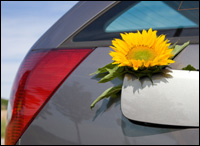Dear Umbra,
I have been wondering for years now — with the hot trend toward hybrids and the new “clean” diesels hitting the market, why doesn’t anyone talk about a diesel hybrid? Sounds like the best of both worlds to me. Just think: a hybrid running on biodiesel! Is this in the works?
Mike H.
Saranac Lake, N.Y.
Dearest Mike,
It does sound like the best of both worlds, if the only two worlds are diesels and hybrids. There may be another world, with enough public transit to obviate the need for using one’s personal automobile. Actually, that’s the world where diesel hybrids already exist. The Seattle area’s Metro Transit bus fleet, for one, includes some diesel-hybrid buses that — best of three worlds! — ran on a blend of biodiesel and ultra-low sulfur diesel (until biodiesel ballooned to more than $6 a gallon). Mass transit is where it’s at.

Move your bloomin’ arse!
When it comes to personal cars, alas, the diesel and hybrid worlds are trying to collide, but missing. In March, Volkswagen showed off a new hybrid-electric turbo-diesel at a European car show (Geneva, doncha know) and, looking back at the archived press, everyone fawned over the numbers — including miles per gallon in the high 60s. I read only archived press because VW apparently decided not to build the car after all, citing expense and saying they’ll instead build a gasoline-hybrid version. Other rumored hybrid diesels, slated to appear circa 2010 if all goes well, include an Indian-made pickup truck, a Peugeot, a Mercedes concept car, and a Citroen concept car called the C-Cactus.
To back up for the general reader, a diesel hybrid entices the carbon-conscious driver because it combines two high-efficiency engines. Hybrids use a battery to capture energy generated from the combustion engine. Diesel fuel contains more energy than gasoline, and diesel engines are generally more energy efficient than gasoline engines. Cleaner-burning ultra-low sulfur diesel, meanwhile, will become mandatory in the U.S. in the next few years, and its use — in combo with new-and-improved engine technologies and emissions controls — will allow new diesels to spew fewer pollutants. Also coming to the U.S. in the next few years are new and efficient diesel vehicles by manufacturers other than VW and Mercedes (Honda, Honda, Honda hooray!). Still, not a single diesel model currently available in the U.S. made the annual Greenest Vehicles list from the American Council for an Energy-Efficient Economy.
Now, this researcher is not particularly interested in engines and has a little trouble following exactly why manufacturers are stuck in the diesel-hybrid “concept car” stage. I’m in the “We sent guys to the moon 40 years ago, so why can’t we make cars with reasonably low emissions?” camp, which will not go far in specifically answering your question. Engaged commentators repeatedly mention two factors: expense and emissions standards. Emissions regulations in Europe and California, the largest car market in the U.S., are still difficult to meet with a diesel engine, and automakers apparently fear they won’t make fat enough profits. But the technology does seem to be moving forward, so keep posted.
Particularly keep posted on whether diesel or diesel hybrids are any better than currently available fuel-efficient gasoline or gasoline-hybrid cars. Unless you live near a steady source of biodiesel (and can afford to buy it), they might not be. For those of us who have a biodiesel source, we’ll need to check back in when the Honda diesels arrive in the U.S. market and see if my excitement is merited.
Fervently,
Umbra


